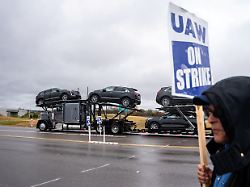Agreement also with GM
UAW strike ends with record settlements
October 31, 2023, 2:25 a.m
Listen to article
This audio version was artificially generated. More info | Send feedback
The strikers’ perseverance was worth it: after six weeks, the labor dispute in the US automobile industry ends. After Ford and Stellantis, General Motors also agrees to a compromise with the UAW union. Experts expect that the success of the negotiations will spread to other industries.
The historic simultaneous strike against the three major US car manufacturers Ford, Stellantis and General Motors (GM) is over. GM was the last of the “Detroit Three” to reach a tentative agreement with the United Auto Workers (UAW) union. They went on strike at up to nine companies in the three companies at the same time for six weeks and thereby negotiated record payments for their members. President Joe Biden welcomed the outcome. “These record agreements are a reward for the automotive industry workers who gave up much to keep the industry afloat during the financial crisis more than a decade ago.”
The UAW negotiated a similar package with GM as it had with the other two automakers. The salary for experienced workers in the highest group increases by 33 percent. As the Reuters news agency learned from two insiders, GM’s personnel costs rose by seven billion dollars over a period of 4.5 years. The Bloomberg news agency had reported that the agreement included a 25 percent increase in hourly wages and an adjustment for inflation.
The union says workers should end their strike while the new contract is ratified. “We look forward to having all employees at all of our operations get back to work,” said GM CEO Mary Barra. Stellantis had agreed to a wage increase of 25 percent over a period of four and a half years. The Chrysler parent company also pledged 19 billion euros in investments in the USA and 5,000 additional jobs. Stellantis also prevented a strike in Canada through a collective bargaining compromise. At Ford, the tariff increases amount to 33 percent over the entire contract term.
According to experts, it is an important victory for the union after the UAW made major concessions after the 2008 financial crisis and wages stagnated for a long time. Almost 50,000 of the almost 150,000 union members at the three car companies stopped work in several assembly plants and spare parts delivery centers. Due to a lack of supplies or buyers, other factories or suppliers were also affected. The labor dispute has already cost the “Detroit Three” and its suppliers billions.
German car manufacturers without unions
The companies fear rising labor costs will put them at a disadvantage in competition with Tesla and Toyota, which do not negotiate tariffs with the UAW. The plants of the German car manufacturers Volkswagen, Mercedes-Benz and BMW are also non-union. They are located in southern US states where unions have a difficult time. Several attempts by the UAW to win a majority of employees in votes to begin collective bargaining negotiations at VW and Mercedes failed.
Experts expect the UAW’s negotiating success to spread to other industries. The pay of employees in non-tariff companies is sometimes even higher than that of employers who adhere to collective bargaining agreements. Over the past 40 years, unionization rates among U.S. workers have roughly halved to 11 percent, according to data from the Economic Policy Institute. According to John Logan of San Francisco State University, the UAW bargaining agreement could make it easier for the union to capture companies that have previously been exempt from collective bargaining. “The Big Three would be fine with the UAW organizing Tesla,” he said. The union recently hinted at this. In the next major collective bargaining round in 2028, negotiations will not only take place with the “Big Three”, but also with the “Big Five” or “Big Six”.
According to a Reuters poll, the UAW strike had strong support among the US population. Workers’ dissatisfaction with their pay in the face of record profits contributed to companies making concessions, said Marcos Feldman, a researcher at an employee-focused foundation. Unions also prevailed at the parcel service provider UPS and the construction machinery manufacturer Caterpillar. “The unionization effort is the most aggressive it has ever been,” Feldman said. Now it is important to consolidate and institutionalize them.
